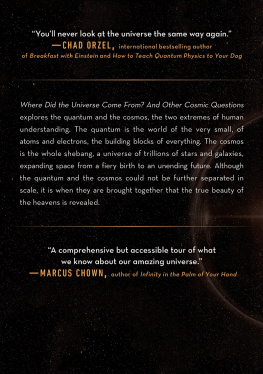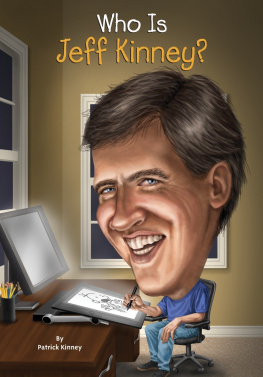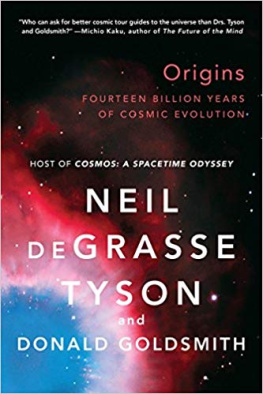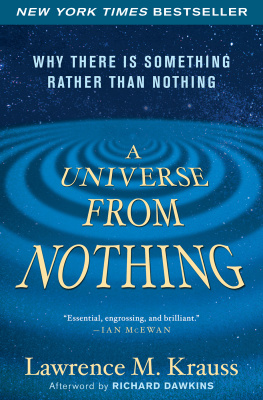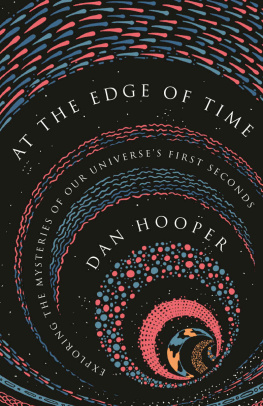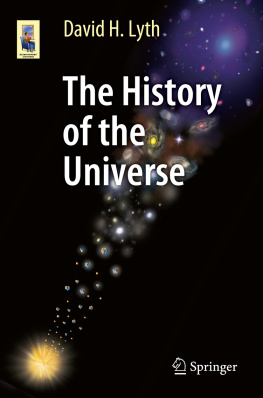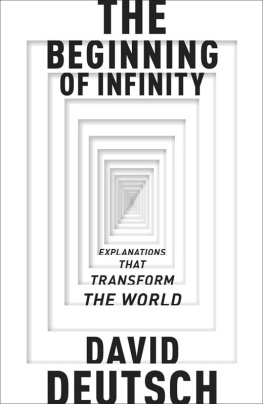Will Kinney - An Infinity of Worlds : Cosmic Inflation and the Beginning of the Universe
Here you can read online Will Kinney - An Infinity of Worlds : Cosmic Inflation and the Beginning of the Universe full text of the book (entire story) in english for free. Download pdf and epub, get meaning, cover and reviews about this ebook. year: 2022, publisher: MIT Press, genre: Children. Description of the work, (preface) as well as reviews are available. Best literature library LitArk.com created for fans of good reading and offers a wide selection of genres:
Romance novel
Science fiction
Adventure
Detective
Science
History
Home and family
Prose
Art
Politics
Computer
Non-fiction
Religion
Business
Children
Humor
Choose a favorite category and find really read worthwhile books. Enjoy immersion in the world of imagination, feel the emotions of the characters or learn something new for yourself, make an fascinating discovery.

- Book:An Infinity of Worlds : Cosmic Inflation and the Beginning of the Universe
- Author:
- Publisher:MIT Press
- Genre:
- Year:2022
- Rating:4 / 5
- Favourites:Add to favourites
- Your mark:
- 80
- 1
- 2
- 3
- 4
- 5
An Infinity of Worlds : Cosmic Inflation and the Beginning of the Universe: summary, description and annotation
We offer to read an annotation, description, summary or preface (depends on what the author of the book "An Infinity of Worlds : Cosmic Inflation and the Beginning of the Universe" wrote himself). If you haven't found the necessary information about the book — write in the comments, we will try to find it.
Will Kinney: author's other books
Who wrote An Infinity of Worlds : Cosmic Inflation and the Beginning of the Universe? Find out the surname, the name of the author of the book and a list of all author's works by series.
An Infinity of Worlds : Cosmic Inflation and the Beginning of the Universe — read online for free the complete book (whole text) full work
Below is the text of the book, divided by pages. System saving the place of the last page read, allows you to conveniently read the book "An Infinity of Worlds : Cosmic Inflation and the Beginning of the Universe" online for free, without having to search again every time where you left off. Put a bookmark, and you can go to the page where you finished reading at any time.
Font size:
Interval:
Bookmark:
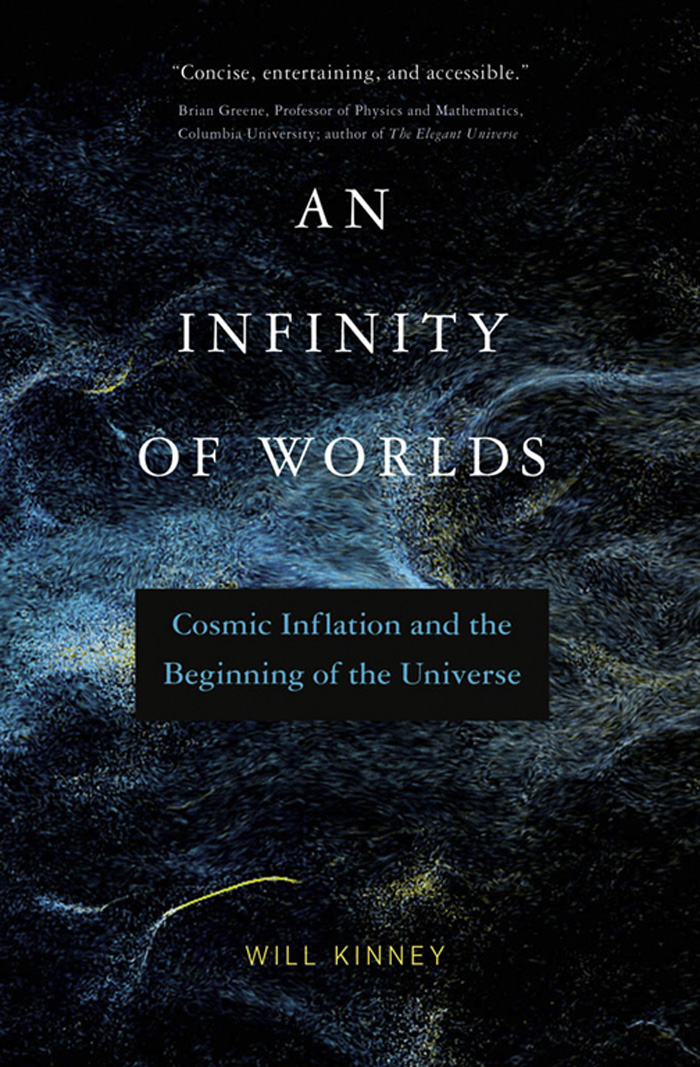
Will Kinney
The MIT Press
Cambridge, Massachusetts | London, England
2022 Massachusetts Institute of Technology
All rights reserved. No part of this book may be reproduced in any form by any electronic or mechanical means (including photocopying, recording, or information storage and retrieval) without permission in writing from the publisher.
The MIT Press would like to thank the anonymous peer reviewers who provided comments on drafts of this book. The generous work of academic experts is essential for establishing the authority and quality of our publications. We acknowledge with gratitude the contributions of these otherwise uncredited readers.
This book was set in ITC Stone Serif Std and ITC Stone Sans Std by New Best-set Typesetters Ltd.
Library of Congress Cataloging-in-Publication Data
Names: Kinney, Will, author.
Title: An infinity of worlds : cosmic inflation and the beginning of the universe / Will Kinney.
Description: Cambridge, Massachusetts : The MIT Press, [2022] | Includes bibliographical references and index.
Identifiers: LCCN 2021008639 | ISBN 9780262046480 (hardcover)
Subjects: LCSH: Multiverse. | CosmologyMathematical models.
Classification: LCC QB981 .K56 2022 | DDC 523.1/2dc23
LC record available at https://lccn.loc.gov/2021008639
10987654321
d_r0
For Selene. You are my moon and my stars.
There is a story, perhaps apocryphal, about the physicist Neils Bohr and famous Heisenberg uncertainty principle of quantum mechanics. Bohr was known to assert in public lectures that the complementarity under the uncertainty relation between position and momentum in quantum physicsincreasing precision in one results in more uncertain knowledge of the otherapplies to everything. Everything in the world, according to Bohr, has a quantum complement. As the story goes, a member of the audience at one of his lectures asked him afterward, Professor Bohr, if everything has a complement, then what is the complement of truth? Without missing a beat, Bohr replied, Clarity. So it is with science writing. There is an inevitable trade-off between making something simple and understandable, and making it complete and fully correct. I hope I have struck an adequate balance in what follows, but I have struck a balance. (I have, for example, chosen to give short shrift to modified theories of gravity, string gas and related cosmological models with thermal boundary conditions, the youngness problem in eternal inflation, and various interesting attempts to define a useful measure of probability on the inflationary multiverse.) For the reader disappointed over a favorite idea glossed over, I can only appeal to the balance between clarity and truth, which is a narrow path I have tried my best to tread honestly. This is not a history of science book, although I have made every effort to include the relevant history of the field as accurately as possible. Likewise, it is not a book dedicated to the philosophy of science, and I attempt to hew as closely as possible to physicist Richard Feynmans belief that the philosophy of science is as useful to scientists as ornithology is to birds. In this, I ultimately fail; given the nature of the subject, philosophy becomes inescapable.
When I was a young man growing up in the American West, sources of information were few compared to the present day. I had access to only one television station (two if the weather was right), and could not receive Carl Sagans Cosmos, which aired on PBS. My wonderful science and math teachers at Whitefish High School were men who worked as smoke jumpers and rangers in Glacier National Park in their summers off, and their expertise ran more to forestry than astronomy. Scientific American was a lifeline for me. The magazine then was written by the researchers themselves, and beautifully filled a gap between journal publications and more popular science. I read it avidly. I haveconsciously and unconsciouslyborrowed from that early influence here and studiously ignored most of the rules set down by self-appointed experts in science communication. Instead, I have attempted to emulate the science writing that has had the largest influence on mehard reads like Steven Pinkers The Blank Slate, Richard Dawkinss magnificent pair of books The Selfish Gene and The Extended Phenotype, Douglas Hofstadters Gdel, Escher, Bach, and Steven Weinbergs The First Three Minutesand have taken stylistic inspiration from writers such as Joan Didion, Annie Dillard, Norman Maclean, and Antoine de Saint-Exupry. I manage at best a pale echo of these giants. But in the end, the voice is my own, and a part of me is still back in the deep woods of Montana, up late at night with my friends, marveling at the sky alight with luminescent curtains of aurora borealis, popping and crackling above the treetops.
Once upon a time, before ever this world was made, there was neither earth nor sea, nor air, nor light, but only a great yawning gulf, full of twilight, where these things should be.
Norse creation myth
The universe had a beginning.
Everything we see, everything we ever will see, and everything we are came from this beginning. It began in unimaginably hot fire almost fourteen billion years ago, in which the first elements were forged. The fire cooled, the universe grew dark, and then the first stars flickered into brief lives and filled the cosmos with light. Modern precision cosmology has illuminated the details of our cosmic origins, such as the expansion of the universe, formation of cosmological structure, abundances of the elements, and existence of exotic dark matter, dark energy, and the cosmic microwave background (CMB)the faint glow left over from the primordial fire. The result is a remarkably consistent picture of the origin and structure of the cosmos known as the standard cosmological model, with parameters such as the curvature of space and density of matter measured at the level of a few percent. This physical theory of the hot infant universe, known as the big bang, is one of the most consequential developments of science in the twentieth century. But as successful as the big bang picture of the universe has been, it leaves many questions unanswered. Why is the universe so big? Why is it so old? What is the origin of structure in the cosmos? Why was the early universe so simple?
Where did the big bang come from anyway?
The theory of cosmological inflation is our first attempt to answer these existential questions of the cosmos. Inflation can be most simply described as a theory for what happened before the primordial fire of the early universe. It is a remarkable new unification of inner space and outer space, in which the physics of the very large (the cosmos) meets the physics of the very small (elementary particles and fields), closing in a full circle at the first moment of time. This new picture of cosmic origins contains quantum uncertainty as a fundamental feature, opening the possibility that the origin of the universe itself was of a quantum nature. In this way, inflation ties questions of the origin of the universe to the unification of gravity and quantum physics, and in so doing, challenges our notions of what we mean by a scientific theory at all. For this reason, the idea has attracted no small amount of controversy. Inflation
Next pageFont size:
Interval:
Bookmark:
Similar books «An Infinity of Worlds : Cosmic Inflation and the Beginning of the Universe»
Look at similar books to An Infinity of Worlds : Cosmic Inflation and the Beginning of the Universe. We have selected literature similar in name and meaning in the hope of providing readers with more options to find new, interesting, not yet read works.
Discussion, reviews of the book An Infinity of Worlds : Cosmic Inflation and the Beginning of the Universe and just readers' own opinions. Leave your comments, write what you think about the work, its meaning or the main characters. Specify what exactly you liked and what you didn't like, and why you think so.

